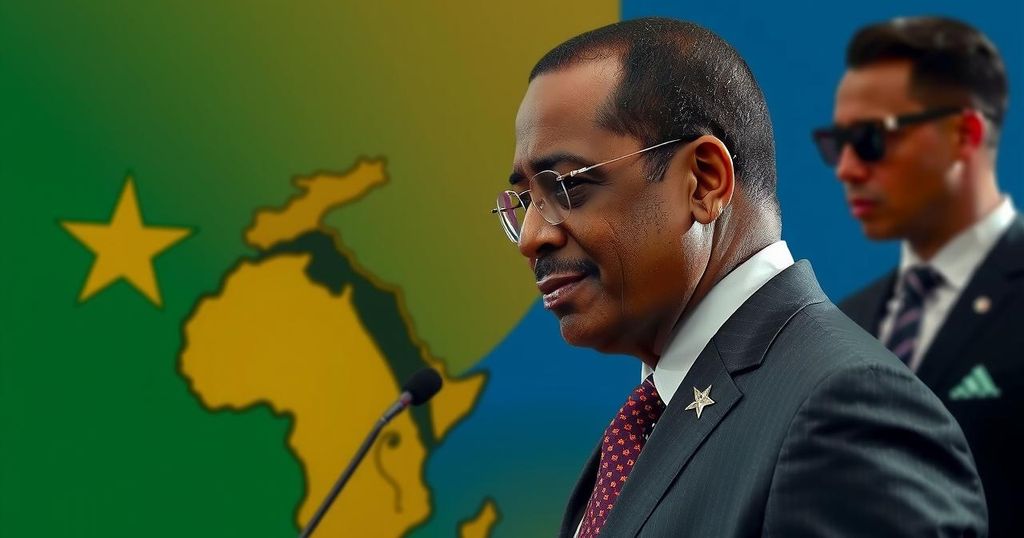Zimbabwe is accused of interfering in the electoral processes of neighboring countries, notably Botswana, Namibia, and Mozambique, with opposition parties alleging that the ruling Zanu-PF is manipulating elections to support friendly regimes. The ruling party’s partnerships and actions, including support for the Frelimo party in Mozambique and campaigning in Botswana, have attracted scrutiny and protests amid concerns of undermining electoral sovereignty. While Zimbabwe denies these allegations, the unfolding situation raises critical questions about regional governance and political integrity.
Zimbabwe is facing allegations of electoral interference in neighboring nations, predominantly from opposition groups in Botswana, Namibia, and Mozambique, who claim that the ruling Zimbabwe African National Union – Patriotic Front (Zanu-PF) is meddling in their electoral processes. With Zanu-PF being one of the few remaining liberation movements in power within Southern Africa, it asserts that it is combating neo-colonial influences attempting to reclaim power in the region. Ahead of the contentious elections on October 9, Zanu-PF sent campaign teams to support Mozambique’s ruling party, the Front for the Liberation of Mozambique (Frelimo), which facilitated Frelimo’s rallies in Zimbabwe to engage the diaspora electorate. Reports indicate that Zanu-PF members may have participated in the elections through Mozambique’s diaspora voting system. Additionally, in Botswana, Zanu-PF representatives have been collaborating with President Mokgweetsi Masisi’s Botswana Democratic Party (BDP) as they approach their elections on October 30. Meanwhile, protests erupted in Namibia against a South African company tasked with printing ballots for the country’s elections, with opposition linking it to associates of President Emmerson Mnangagwa of Zimbabwe. Earlier this year, Zanu-PF held a liberation party conference within the Southern African Development Community (SADC) aimed at consolidating support against perceived threats from former colonial powers. While several parties chose not to support Zimbabwe in the August 2023 elections, Zanu-PF’s involvement has been notable across Botswana, South Africa, Mozambique, and Namibia. Former Botswana President Ian Khama condemned Zimbabwe’s alleged interference in his country’s elections, stating, “Remember (President) Mnangagwa went on national television and promised to help (President) Masisi win elections. The ruling party is preparing to rig the general election by using Zimbabweans to vote here in Botswana.” Zimbabwean opposition leader Job Sikhala urged SADC to take action against Zanu-PF, describing its approach as territorial interference. Despite the mounting allegations, Nick Mangwana, Zimbabwe’s government spokesperson, firmly rejected claims of interference, asserting, “Zimbabwe works with any government democratically elected into office in the region.” The state of affairs between Zimbabwe and its neighbors escalated earlier this year, when Zambia accused Zimbabwean officials of attempting to influence its elections, leading to diplomatic tensions. Complaints arose following President Mnangagwa’s comments on Zambia’s relationships with Western countries, which he deemed a regional security threat. Mr. Mangwana emphasized Zimbabwe’s neutral stance on foreign elections, urging local political parties to earn their electoral victories independently. The scrutiny increased further when President Mnangagwa prematurely congratulated Frelimo for winning the recent elections in Mozambique, before official results were announced, amidst allegations of electoral manipulation by the opposition. As the current chair of SADC, Zimbabwe may be compelled to mediate tensions stemming from these electoral disputes, highlighting contradictions in its regional role and diplomatic engagements. Experts have noted that Mnangagwa’s actions not only undermine the electoral integrity of neighboring nations but also reflect poorly within the region. The entrenched silence surrounding these issues raises concerns regarding regional cooperation and governance standards.
The article addresses the ongoing accusations against Zimbabwe’s ruling party, Zanu-PF, regarding alleged interference in the electoral processes of neighboring countries in Southern Africa. This situation is particularly complex, as it involves historical ties to liberation movements and the current political dynamics within the region. The article explores the implications of Zimbabwe’s actions during elections in Mozambique, Botswana, and Namibia, reflecting the delicate nature of regional politics and the legacy of colonialism.
The allegations of electoral interference against Zimbabwe’s Zanu-PF by opposition groups in neighboring nations raise significant concerns about electoral integrity and sovereignty in Southern Africa. While Zanu-PF positions itself as a defender against neo-colonial influences, criticisms from various political leaders indicate a troubling pattern of involvement in the electoral affairs of its neighbors. With calls for SADC to respond to these claims and the potential diplomatic repercussions, the situation underscores the need for a critical examination of political dynamics within the region, especially as Zimbabwe holds the SADC chairmanship.
Original Source: www.theeastafrican.co.ke






